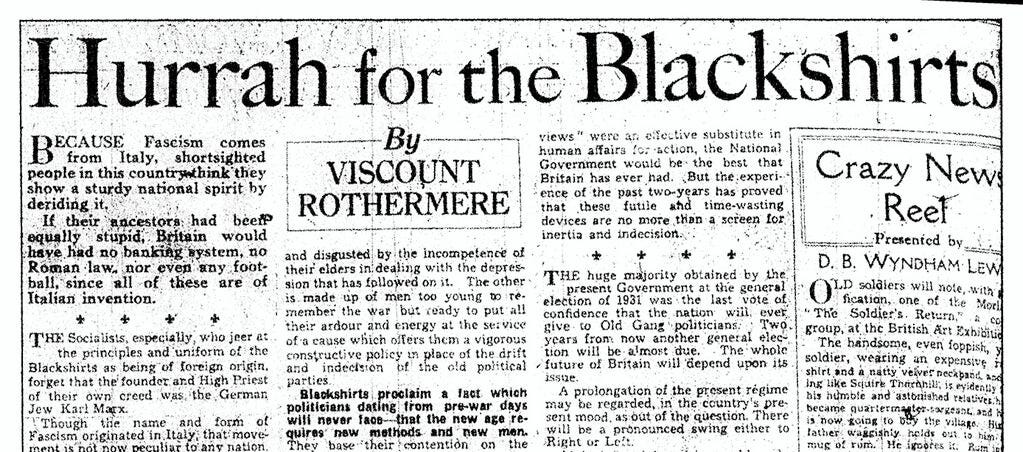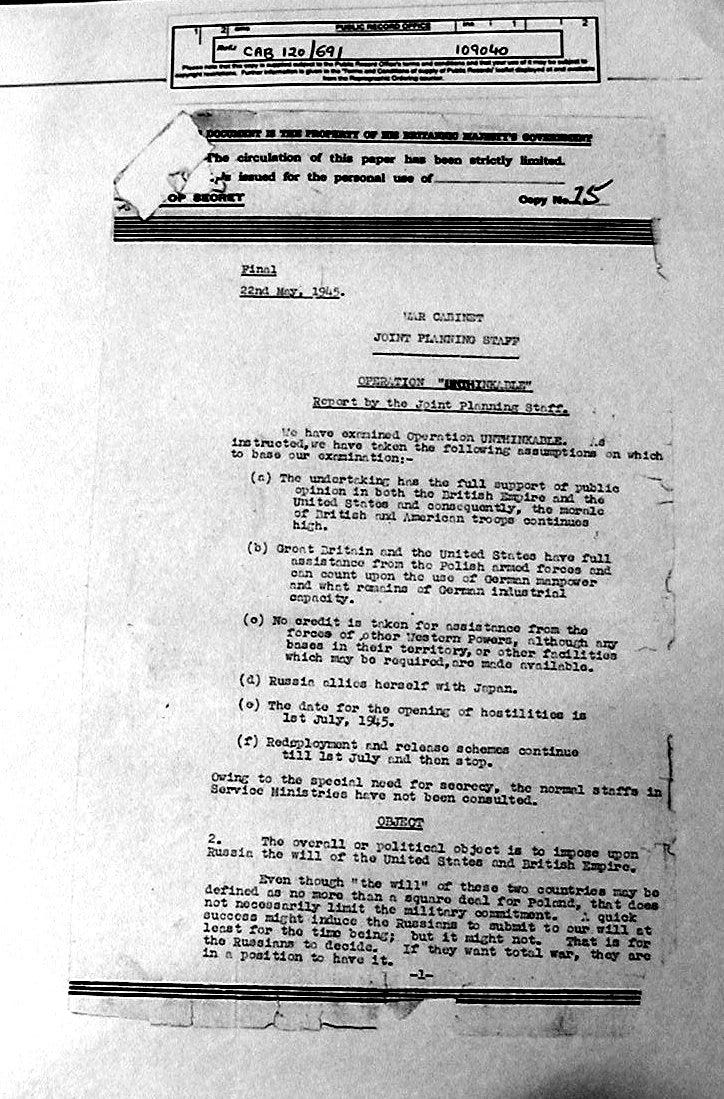That Time Churchill Wanted to Start World War III, Before World War II was Even Over
by
As the great industrial slaughter of human beings that was World War 2 came to an end and Germany was being divided the British government was drawing up plans to re-arm the Nazi’s and along with the Americans, plan a surprise attack against the Soviet Union.
The target date for this incredible insanity was July 1, 1945. Less than 2 months after World War 2s end.
In Greece, Britain put into practise a taste of what Churchill wanted to come to the Soviet Union : by massacring anti-fascist partisans to bolster the Nazi collaborating regime.
The British (and American) ruling class barely de-nazi’fied West Germany. From 1949 to 1973, 90 of the 170 leading judges and lawyers in the West German Justice Ministry were former members of the Nazi Party. (1)
Of them, 34were former Sturmabteilung (SA). The SA being the paramilitary group who assisted Hitler in his rise and took part in Kristallnacht, the violent night that killed 91 Jews.(2)
At the close of the war Britain was vastly weaker and from here onward would fall lock-step into the shadow of the United States as Churchill remarked at Yalta in homely terms of being between the Big Russian bear and the American Buffalo was the “British donkey”. (3)
The reasons so little effort went into de-nazifying West Germany was ultimately because the ruling class held a common class interest with the German Nazi’s. Not only were prominent nazi’s funnelled via rat lines to the United States under Operation Paperclip that had participated in some of the most horrific forms of violence but ideologically liberalism preferred white supremacy and fascism to communism.
As Harry Rositzke, a former head of CIA secret operations put it,
“It was a visceral business of using any bastard as long as he was anti-Communist.” (4)
Liberalism always courts fascism when capitalism begins to fail. You can see this in the Daily Mails “Hurrah for the Blackshirts” which had a circulation of around 2 million people (in a population of 46 million at the time!).

This is also demonstrated in Winston Churchill’s views and actions, from his belief that, “the aryan stock is bound to triumph”.
The young Churchill charged through imperial atrocities, defending each in turn. When concentration camps were built in South Africa, for white Boers, he said they produced “the minimum of suffering”. The death toll was almost 28,000, and when at least 115,000 black Africans were likewise swept into British camps, where 14,000 died, he wrote only of his “irritation that Kaffirs should be allowed to fire on white men”. Later, he boasted of his experiences there: “That was before war degenerated. It was great fun galloping about.”
Then as an MP he demanded a rolling programme of more conquests, based on his belief that “the Aryan stock is bound to triumph”.(5)
To his even more evil deeds which mark him as a genocidal maniac in India which has led one Indian politician to say Churchill had as much blood on his hands as Hitler.
“…Nor is there any memorial to the massacres of the Raj, from Delhi in 1857 to Amritsar in 1919, the deaths of 35 million Indians in totally unnecessary famines caused by British policy,” he added.(6)
“Churchill has as much blood on his hands as Hitler does. Particularly the decisions that he personally signed off during the Bengal Famine when 4.3 million people died because of the decisions he took or endorsed.” — Dr Shashi Tharoor,(7)
Not only did British inaction in India exacerbate the famines but it was actively encouraged by Churchill who remarked they “bred like rabbits”. Britain actively turned away ships from Australia and America trying to supply grain to ease the famine.
In 1943, as millions were dying of starvation in 1943 in Bengal, the birthplace of the Raj, Churchill not only refused to help but prevented others from doing so, commenting that Indians “bred like rabbits.” The Churchill industry, more interested in the great man’s dentures than in his war crimes, has managed to keep this appalling story fairly quiet.
It establishes how Churchill and his associates could easily have stopped the famine with a few shipments of foodgrains but refused, in spite of repeated appeals from two successive Viceroys, Churchill’s own Secretary of State for India and even the President of the United States.(8)
His passing into history as an iconic figure of immense stature happened in an almost Goebbels-esque fashion.
The immense death that Churchill presided over made him a prime figure to conjure up the bizarre (but aptly named) Operation Unthinkable. The overall objective of Operation Unthinkable was to:
“impose upon Russia the will of the United States and British Empire” (9)

The Chief of the Army, Sir Alan Brooke, was disgusted with Winston Churchill and likened him to a warmonger. Brooke wrote in his diary:
‘Winston gives me the feeling of already longing for another war!’ (10)
According to Alan Brook, Churchill told him at the Potsdam Conference in July 1945:
“We can tell the Russians if they insist on doing this or that, well we can just blot out Moscow, then Stalingrad, then Kiev, then Sevastopol.”- Churchill (9)
Churchills callous regard for human life and fetish for nuclear annihilation is enough to send a chill down your spine.
Liberalisms relationship and preference with fascism can be seen today in the NATO alliance who released an 8 minute film glorifying the Latvian “Forrest Brothers” who were a cabal of SS collaborators.
By going beyond turning a blind eye to the worship of pro-Hitler forces in Eastern Europe,” said historian Dovid Katz, NATO “is crossing the line right into offering its moral legitimization of Nazi forces such as the Latvian Waffen SS.”(11)
What stopped Churchill from going on this disastrous path?
The War Cabinet listed out the total allied strength in Europe on July 1, 1945: 64 American divisions, 35 British and Dominion divisions, 4 Polish divisions, and 10 German divisions. The German divisions were purely imaginary because after the mauling they received from the Russians, the surviving soldiers were in no hurry to fight. At most, the allies would have mustered 103 divisions, including 23 armoured ones.
Against this force were arrayed 264 Soviet divisions, including 36 armoured. Moscow commanded 6.5 million troops — a 2:1 advantage — on the German border alone. Overall, it had 11 million men and women in uniform.
In aircraft, the Allied Tactical Air Forces in North West Europe and the Mediterranean consisted of 6,714 fighter planes and 2464 bombers. The Soviets had 9380 fighter aircraft and 3380 bombers.(10)
The British army generals got a chance to breathe a sigh of relief as the plan was wholly dependant on the United States yet President Harry Truman expressed in no uncertain terms Truman addressed Churchill via cable, advising that the USA had no intention of participating in, let alone leading, Operation Unthinkable.(13)
The world instead got peace instead of a deranged old mans hunger for World War and nuking of Soviet cities. This peace was of course limited to the imperial core (North America/Western Europe and Japan). But at least Soviet cities weren’t “blotted out” in nuclear annihilation.
The UK (of course) immediately set about sending war to Greece/Indonesia/Vietnam/the brutal dividing of Korea/Malaya/Egypt and Kenya.
Peace for the Soviets though was not an act of kindness from the West.
Peace was contingent on the superior strength of the Red Army at the time which deterred another World War.
The incredible propaganda of the west and the repeating of the “great lie” has led the killer Churchill to be treated as a hero of Britain rather than a monstrous despot that almost led the world to ruin.
References
(1) https://www.warhistoryonline.com/world-war-ii/west-german-government-full-ex-nazis-world-war-ii.html
(2) Ibid.
(3) Fraser J. Harbutt. Yalta 1945: Europe and America at the Crossroads. ISBN-10: 0521856779
(4) Harry Rositzke, quoted in Christopher Simpson, Blowback: America’s Recruitment of Nazis and Its Destructive Impact on Our Domestic and Foreign Policy (Collier Books, 1989), p. 159.
(9) Operation Unthinkable…, p. “1”. Archived from the original on 16 November 2010. Retrieved 25 September 2015.
(10) Alanbrooke War Diaries 1939–1945: Field Marshall Lord Alanbrooke, 2002, ISBN-10: 1842125265


0 Comments:
Post a Comment
Subscribe to Post Comments [Atom]
<< Home